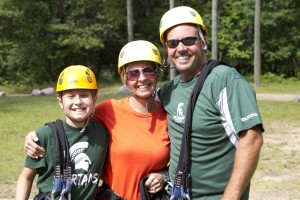 At SpringHill Camps, our mission is not to minister to families, churches or youth groups. Our mission is centered around young people—children, teens and young adults in particular. But this past weekend was a perfect example of why we invite people of all ages to see, hear and experience the Gospel at SpringHill.
At SpringHill Camps, our mission is not to minister to families, churches or youth groups. Our mission is centered around young people—children, teens and young adults in particular. But this past weekend was a perfect example of why we invite people of all ages to see, hear and experience the Gospel at SpringHill.
We hosted Kensington Community Church’s Rock Your Family camp. Of the about 1000 people on site for the weekend, less than half of them were kids. But it was clear to me that, in terms of our mission, we were hitting it out of the park.
What we were doing was leveraging context in able to maximize the impact and life change. Here’s how:
The context of family.
Our recently updated video, Kids Need Camp, points out that the average kid in America spends just 3 and a half minutes a week—yes, a week—in meaningful conversation with their parents. But at a 36-hour family camp experience, those same kids had unfiltered access to their parents during worship, around the campfire, in the cabins at night, standing in line for the waterslide, splashing in the lake, sitting in a canoe or on a horse… and the list goes on.
Ultimately, it’s still up to kids and parents to engage in a meaningful way. Our mission says we are about creating experiences wherein young people can grow, and each of those places provides the opportunity for that growth.
By the way, I believe the family context is one of the most powerful for impacting young people, because of the potential for lasting, long-term impact:
- Families have a built-in expectation for interaction. While they may not always capitalize on it, a retreat or vacation experience for a family can provide a jump-start for what everyone in the family already believes should be happening.
- Families provide the best opportunity for immediate follow-up. Because they were together during the camp, an engaged parent can know exactly where to begin in the car, and in the days that follow at home, to continue their child’s spiritual growth. A child does not re-enter the family having had an individual experience, they go home together having had a shared experience.
- Families provide the best opportunity for long-term follow-up. Unlike a church, youth group, youth pastor, or camp counselor, in most cases the family moves together, lives together and maintains engagement for decades.
- When individuals in families are changed, whole families can change. Each year we hear stories of families that had been on the verge of failure, headed for divorce, who decided to give it one more weekend, one more shot. This past Saturday night, one family’s conversation around the campfire went something like this, “Kids, we’ve decided not to divorce.” That kind of transformation will continue to pay dividends in the spiritual growth of those kids—and their kids—for generations.
How are you leveraging the context of family to minister to individuals in your ministry?
In my next few posts, I’ll address the 3 other primary contexts we leverage to impact young people at camp: youth groups, cabin groups, and the staff experience.